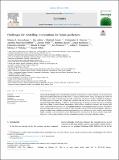Challenges for modelling interventions for future pandemics
Abstract
Mathematical modelling and statistical inference provide a framework to evaluate different non-pharmaceutical and pharmaceutical interventions for the control of epidemics that has been widely used during the COVID-19 pandemic. In this paper, lessons learned from this and previous epidemics are used to highlight the challenges for future pandemic control. We consider the availability and use of data, as well as the need for correct parameterisation and calibration for different model frameworks. We discuss challenges that arise in describing and distinguishing between different interventions, within different modelling structures, and allowing both within and between host dynamics. We also highlight challenges in modelling the health economic and political aspects of interventions. Given the diversity of these challenges, a broad variety of interdisciplinary expertise is needed to address them, combining mathematical knowledge with biological and social insights, and including health economics and communication skills. Addressing these challenges for the future requires strong cross-disciplinary collaboration together with close communication between scientists and policy makers.
Citation
Kretzschmar , M E , Ashby , B , Fearon , E , Overton , C E , Panovska-Griffiths , J , Pellis , L , Quaife , M , Rozhnova , G , Scarabel , F , Stage , H B , Swallow , B , Thompson , R N , Tildesley , M J & Villela , D 2022 , ' Challenges for modelling interventions for future pandemics ' , Epidemics , vol. 38 , 100546 . https://doi.org/10.1016/j.epidem.2022.100546
Publication
Epidemics
Status
Peer reviewed
ISSN
1878-0067Type
Journal article
Description
Funding: This work was supported by the Isaac Newton Institute (EPSRC grant no. EP/R014604/1). MEK was supported by grants from The Netherlands Organisation for Health Research and Development (ZonMw), grant number 10430022010001, and grant number 91216062, and by the H2020 Project 101003480 (CORESMA). RNT was supported by the UKRI, grant number EP/V053507/1. GR was supported by Fundação para a Ciência e a Tecnologia (FCT) project reference 131_596787873. and by the VERDI project 101045989 funded by the European Union. LP and CO are funded by the Wellcome Trust and the Royal Society (grant 202562/Z/16/Z). LP is also supported by the UKRI through the JUNIPER modelling consortium (grant number MR/V038613/1) and by The Alan Turing Institute for Data Science and Artificial Intelligence. HBS is funded by the Wellcome Trust and Royal Society (202562/Z/16/Z), and the Alexander von Humboldt Foundation. DV had support from the National Council for Scientific and Technological Development of Brazil (CNPq - Refs. 441057/2020-9, 424141/2018-3, 309569/2019-2). FS is supported by the UKRI through the JUNIPER modelling consortium (grant number MR/V038613/1). EF is supported by UKRI (Medical Research Council)/Department of Health and Social Care (National Insitute of Health Research) MR/V028618/1. JPG's work was supported by funding from the UK Health Security Agency and the UK Department of Health and Social Care.Collections
Items in the St Andrews Research Repository are protected by copyright, with all rights reserved, unless otherwise indicated.

